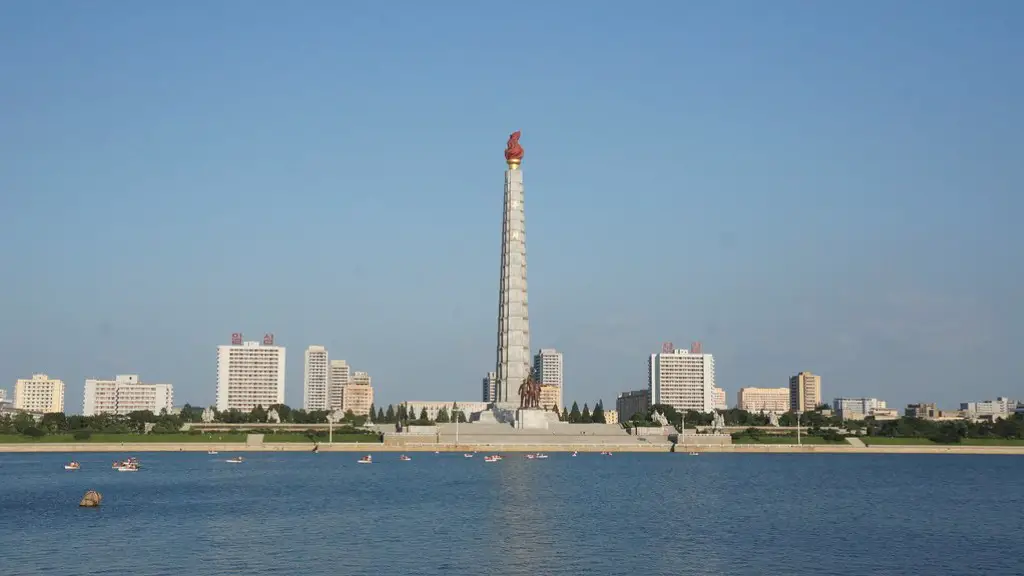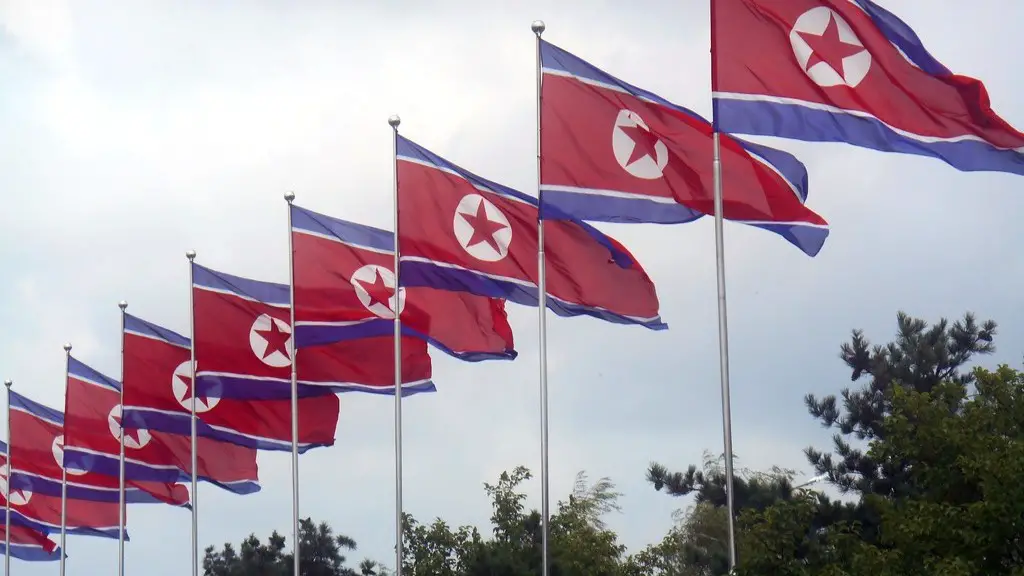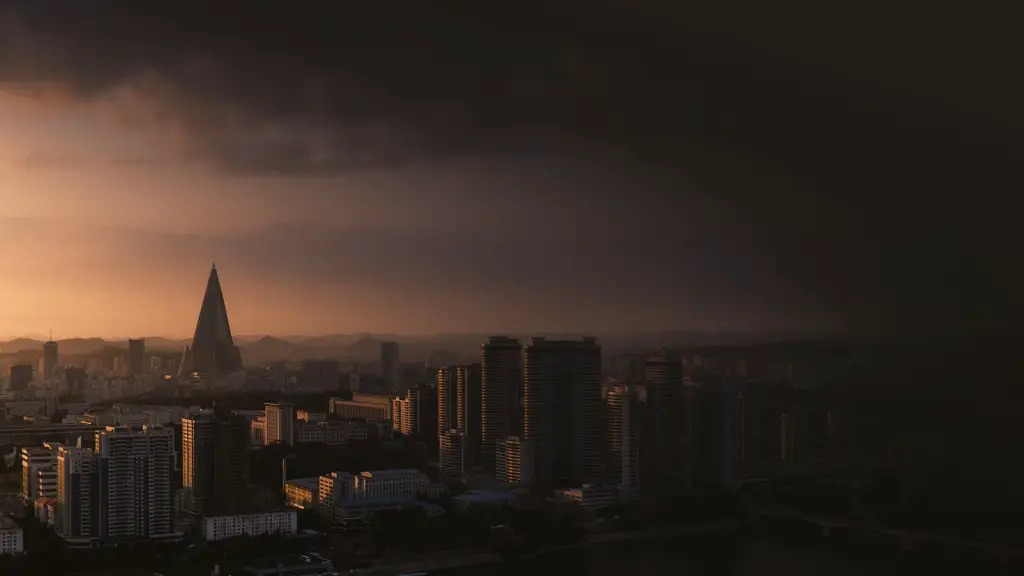Outline of the Regime
North Korea, officially the Democratic People’s Republic of Korea (DPRK), has been ruled by the Kim family for over seven decades. The regime is led by the current Supreme Leader Kim Jong-un and the Workers’ Party of Korea, which is the country’s sole governing party. The regime maintains tight control over the media and implements strict laws that restrict citizens’ ability to travel outside the country or to obtain information from other sources. The government also wields strong influence over the economy, which is largely isolated from the rest of the world and heavily centralized.
The Dynastic Regime
The regime is a dynastic one in which Kim Jong Un and his family are held in very high regard. The regime has a well-developed propaganda system that extols the Kim family and its accomplishments. The regime has a cult-like reverence for the three Kims: Kim Il Sung (the founder of the North Korean regime), Kim Jong Il (his son) and Kim Jong Un (his grandson). They are often referred to as the “Great Leaders”, and their birthdays are celebrated as national holidays.
Power Structure
The North Korean regime is highly centralized and maintains a clear hierarchy of power and authority. Kim Jong Un sits atop this hierarchy as the Supreme Leader. He is assisted by the military, intelligence, and security forces, which are all under his command. The National Defense Commission is responsible for overseeing the military and defense operations of the country. The Politburo and Central Committee of the Workers’ Party of Korea serve as the primary decision-making bodies of the regime.
The economy is also subject to the regime’s control. The government maintains a monopoly on economic activities, and the country remains isolated from the global financial system. Private enterprise is not allowed, and the state owns and manages most economic activities. This economic structure has resulted in a lack of economic diversification and hampered the country’s economic development.
Human Rights Abuses
Under the regime’s rule, North Koreans suffer from a wide range of human rights violations. The government is known for its use of torture, arbitrary detention, and execution of citizens for alleged political offenses. Political and religious freedoms are largely non-existent, and citizens are tightly controlled by the government, which employs surveillance and censorship.
Moreover, North Koreans are forced to adhere to the regime’s Juche ideology, a philosophy developed by the regime’s founder Kim Il Sung. This involves a combination of autarky, militarism, and self-reliance. The regime also promotes a strong culture of Kim family loyalty and propagates a cult of personality around the family.
Living Conditions
The living conditions of the North Korean people are poor and the economy remains weak. The majority of the population lives in poverty and the nation suffers from extreme economic inequality. There is a lack of food, medicine and other basic necessities. Moreover, the country has been dealing with a number of natural disasters in recent years, which have only exacerbated the already precarious living conditions.
In addition, the country has a generally restricted internet access and a lack of access to information. This has led to an environment in which citizens can only obtain information from Government controlled sources, making it difficult to access accurate information from the outside world.
Regime Interaction with the Fellowship
The North Korean regime operates largely unilaterally, and is known for its reluctance to engage with the international community. The regime has, however, held talks with the US, South Korea, and China in recent years. In addition, North Korea has participated in the Six-Party Talks, an international effort to bring peace and stability to the region.
Nonetheless, the regime has refused to accept international sanctions and its nuclear program is still a major concern for its neighbors and the international community at large. The regime has also been accused of human rights abuses and its economic policies remain widely criticized by the international community.
Foreign Relations and Trade
Despite its reluctance to engage with the international community, the North Korean regime maintains diplomatic relations with many countries. Trade is largely restricted and is subject to heavy government control. The regime has strengthened its ties with China in recent years, and China is now one of the country’s major trading partners.
In addition, there has been an increase in economic engagement with South Korea in recent years, although there are still many outstanding issues between the two countries. North Korea’s relations with the US remain strained, although in recent years there has been a push for a negotiation framework.
China’s Role in the Situation
China remains North Korea’s major ally, providing the regime with financial, political and military assistance. China is the largest provider of food aid to North Korea, and is the country’s largest trading partner. Due to its close relations with the regime, China has been able to maintain some influence over North Korean policy.
In addition, China has been at the forefront of international efforts to encourage North Korea to abandon its nuclear program and to pursue greater economic and political engagement with the international community. The Chinese government has also been supportive of North Korean efforts to expand trade links with other countries in the region.
Organizations and NGOs Working in North Korea
Despite the hostile environment, a number of NGOs and organizations from around the world are active within North Korea. These organizations provide aid, support and technical assistance to the North Korean people. The United Nations and its sister organizations, such as the World Food Programme, are in the forefront of these efforts.
In addition, a number of international humanitarian organizations, such as the International Federation of Red Cross and Red Crescent Societies, are also active in the country. These organizations have called for greater access to North Korea, as well as greater international support for the country’s development.
The Future of the Regime
The future of the North Korean regime is uncertain. Although the regime has shown a willingness to engage with the international community in recent years, it continues to be isolated and seen as a rogue state. Many efforts to denuclearize the country have not yet been successful and the human rights situation remains poor.
Furthermore, the regime’s grip on power is showing signs of weakening and it is unclear whether the government will be able to maintain its hold on power for much longer. The future of the North Korean regime is uncertain, but it remains to be seen whether it will be open to reform or succumb to further isolation.


